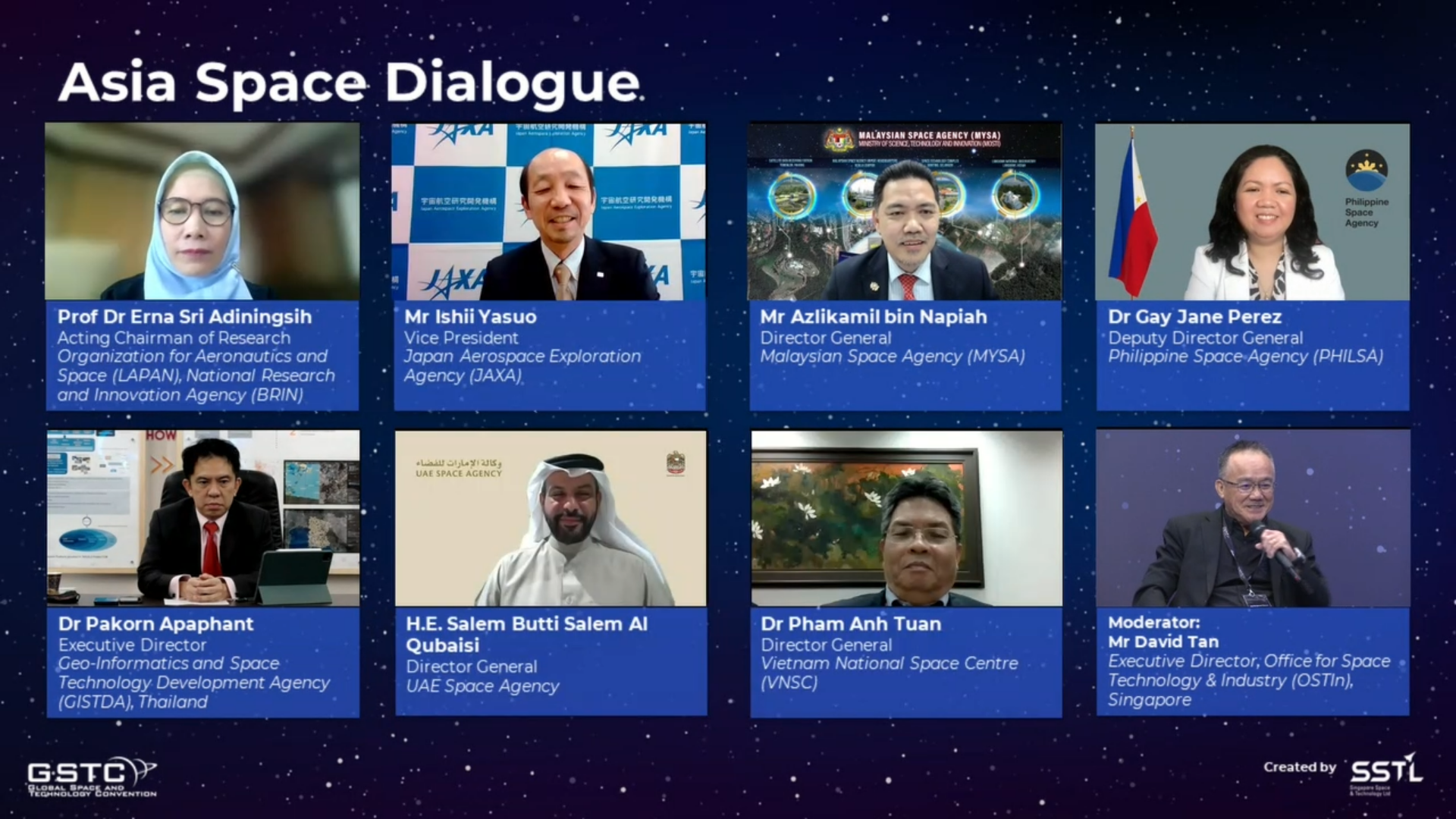Philippine Space Agency (PhilSA) Deputy Director General for Space Science and Technology Dr. Gay Jane P. Perez virtually joined the international panel discussion, “Asia Space Dialogue: Enhancing Regional Cooperation in Space,” held during the 14th Global Space and Technology Convention (GSTC) in Singapore on 09-10 February 2022.
The panel was composed of representatives from various space agencies such as the Research Organization for Aeronautics and Space (LAPAN), National Research and Innovation Agency (BRIN), Japan Aerospace Exploration Agency (JAXA), Malaysian Space Agency (MYSA), Geo-Informatics and Space Technology Development Agency (GISTDA), United Arab Emirates Space Agency (UAESA), and Vietnam National Space Centre (VNSC). Mr. David Tan from the Office for Space Technology & Industry (OSTIn) moderated the discussion, which focused on the impacts of the Asian market growth on the space technology industry. As a region with a large pool of human and material resources, Asia produces more new technology in less time, and the boom of new space tech has highlighted the relevance of space science technology applications (SSTA) to the public and private sectors.
Addressing rapid urbanization through SSTA
Rapid urbanization is one of the many challenges where the space industry would be crucial. And through the mobilization of space borne data, Dr. Perez said, the sustainability of sprawling megacities can be ensured: “Satellite technology can play a crucial role in monitoring both long and short-term developments and impacts of rapid urbanization. Its vantage point from space allows for cost-effective monitoring on traffic congestion, noise and air pollution, and resource availability, such as the water-energy-food (WEF) nexus, in densely populated areas. Space-based technologies and satellite images of course cannot stand alone. With the ability to observe trends on such a tremendous scale, we are better equipped to make predictions, allowing for proactive planning. These available technologies must be leveraged by the scientific community, urban planners, and policy-makers alike in evidence-based decision-making towards sustainable urbanization.”
Dr. Perez also called on the international space community to foster a culture of enhanced data-sharing: “I would like to focus on an enhanced culture of data sharing among the different space agencies. With data, we can do a lot, and we can use this as a guide for policy making.”
Ideas on facilitating further regional collaborations for manpower training were also brought up. By the very nature of the space industry, progress cannot be accomplished alone. Dr. Perez agreed with the other panelists on the significance of forging strong international relations: “Regional collaboration has been essential in the build up of our country’s manpower in space capabilities. Even prior to the establishment of the Philippine Space Agency in 2019, the Philippines, through the Department of Science and Technology, has been engaging in capacity-building programs to develop the skills and capabilities of our local engineers in building satellites.”
Dr. Perez cited the Philippines’ international partnership with Japan as an example. By sending our engineers to partner universities in Japan, they have been able to develop Diwata-1 and Diwata-2. The Philippines is also involved in the BIRDS Project, which provides opportunities to developing countries to learn how to develop small satellites. Through the BIRDS project, the Philippines was able to succeed in developing and launching the Maya satellites series.
Boosting local industries through capacity building
Dr. Perez highlighted how space industry growth helps the economy: “As we continue to create and add value in space, we expand our know-how and capacity from satellite development in university settings to industry settings. Through the enhancement of our local capacities, we strengthen and enable the growth of our local industries, thereby boosting our local space industry and our global competitiveness.”
Speaking later to MySecurity Media, an Australia-based media provider with a strong presence in ASEAN, Dr. Perez gave further examples on how PhilSA is expanding and strengthening the local space community through capacity building. One initiative would be ISKUELA, which stands for: Inclusive SSTA Know-how, Utilization, Exchange, and Localization Activities. The ISKUELA project will engage stakeholders in fostering a culture of science and innovation, by providing training and capacity-building activities to end users in the academe, private sector, industry, and non-governmental organizations.
“Asia Space Dialogue: Enhancing Regional Cooperation in Space” is part of the 14th Global Space and Technology Convention (GSTC) organized by Singapore Space and Technology Limited (SSTL). The GSTC is a premier gathering of space agencies and space industry leaders in Asia, and this is PhilSA’s first year of participation.
Held from 9 to 10 February 2022, this year’s GSTC focused on the key topics of space technology advancements in sectors ranging from communications and connectivity, climate change, environment sustainability, cybersecurity, disaster management, big data, artificial intelligence, and more.




